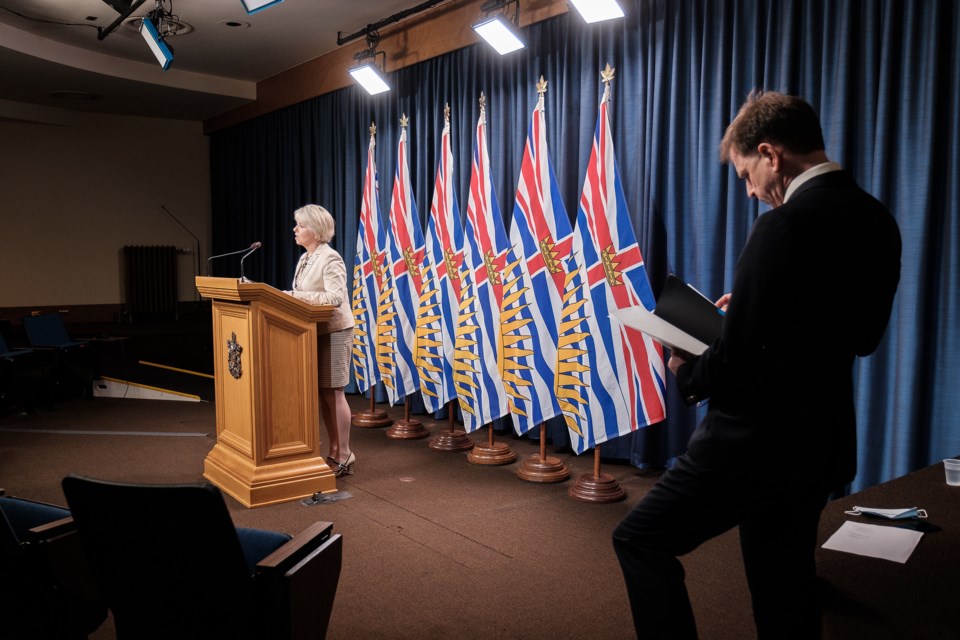BC has backpedalled on changes to school notifications of cases of COVID-19, but still finds itself under fire for the limited way it releases pandemic data.
Dr. Bonnie Henry said she misjudged the anxiety parents would feel after BC stopped providing notifications at schools for every positive case of COVID-19 this month. Instead, the province was hoping to only let parents know if there was a large-scale exposure outbreak, or if a child was found to have come in close contact with someone who tested positive through the normal contract tracing process.
Parents were having none of it, blasting the government and Dr. Henry during the first month of school for being left in the dark while the pandemic’s fourth wave worsened around them. Fears within schools are rising, and for good reason. Fraser Health had to close a school in Chilliwack on Thursday, after an exposure infected more than 20 students and staff with the virus.
“Initially it was my understanding that there was a level of anxiety from the way that we had given broad school notifications last year, but we hear from parents across the province, I hear from educators, and our teams have recognized that parents do need an authoritative source to have an understanding of what's happening at their children's' schools,” she said.
In the absence of the notifications, people were crowd-sourcing school cases through anonymous social media accounts, providing a somewhat better picture, but not necessarily with accurate numbers.
It was clear Premier John Horgan was getting an earful from unhappy families as well.
“I would say that unintended consequences is where we find ourselves,” he said Thursday.
“We wanted to reduce anxiety for parents and families by only advising those who had had a direct contact with a potential COVID case. We revisited that. Dr Henry and the team looked at that and we have new protocols in place. Our objective from the beginning was to reduce anxiety and we're going to continue to listen and respond. I think that's what people expect from us as well.”
Henry promised to have a new system up and running shortly.
It’s not clear if that new system will return to the old method of alerting parents to every case. But if BC’s track record on sharing COVID-19 information is any indication, the fix is unlikely to make everyone happy.
Henry and journalists have been engaged in a simmering war for months now about the restrictive and slow way her office releases pandemic data to the public.
It started back at the beginning of the pandemic in 2020, with hesitancy from Henry to release case counts by community. She argued that giving numbers for cities and towns might somehow shame people or violate their privacy. But other provinces not only released that data successfully, but were able to rally a better public response by sharing such information. BC would eventually capitulate and make city-by-city case data and vaccination rates available.
A similar battle is occurring right now over hospitalization numbers.
CTV reporter Penny Daflos has been reporting on the “secret” number of COVID-19 patients in BC hospitals, noting that the province only reports the number of ICU patients still contagious with COVID-19, and not the total number of COVID-19 patients in hospital who are no longer contagious but can spend days, weeks, or months recovering from the virus.
Henry has countered that she’s sharing the “epidemiologic information” that is most valuable.
But, she also won’t release the full count.
It’s not a dispute likely to seize the public’s interest like the previous fight over city-level case data. But it is emblematic of the inexplicably secretive nature of the BC government on certain COVID-19 data. It has types of numbers and figures it wants to share, and almost everything else is off limits or deemed unnecessary if you ask for it.
The odd thing about the constant fight with the government over COVID data is it appears to have virtually nothing to do with BC politics. There doesn’t appear to be any NDP-ordered secrecy, or conspiracy-level political machinations from the premier’s office and top strategists, unlike with other highly sensitive files.
It is quite simply just two people with all the control on COVID-19 - Dr. Henry and Health Minister Adrian Dix - deciding on their own what information should be public, and mostly disagreeing with their critics that other types of data are necessary for public disclosure.
That’s the way it has been since the start of the pandemic. And it seems the province is destined to continue that way, until whenever this crisis actually ends.
Rob Shaw has spent more than 13 years covering BC politics, now reporting for CHEK News and writing for The Orca. He is the co-author of the national best-selling book A Matter of Confidence, and a regular guest on CBC Radio.
SWIM ON:
- Rob Shaw: ‘Voters sent the Greens a clear message: Get your stuff together, or get lost.’
- Rob wrote about the policy change when it happened, noting parents and the BCTF were decidedly less than pleased.
- BC hiding COVID data was among the subjects discussed on Political Capital 12.



